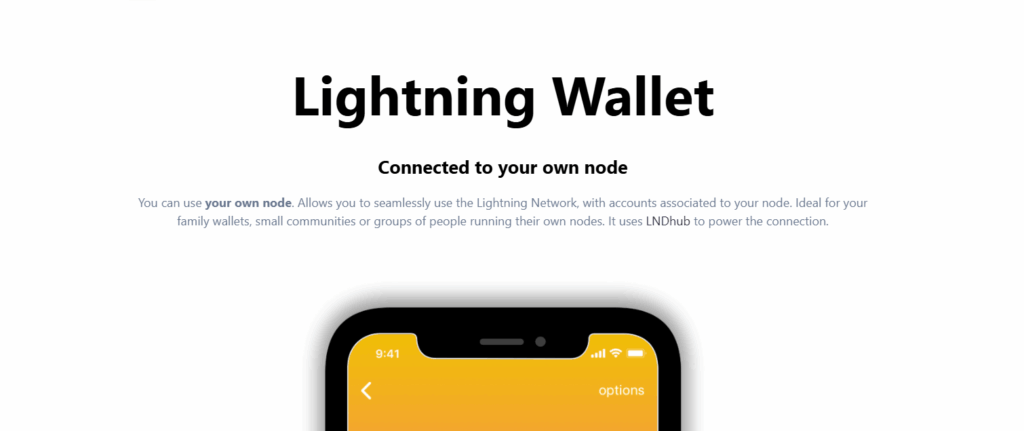This article is about the differences, features, and use cases between the Bitcoin Wallet and Lightning Wallet.
You will understand the ability of Bitcoin wallets to maintain large volume transactions securely and for longer durations as permanent storage, and the capability of Lightning wallets to process payments instantaneously and affordably for everyday use.
Depending on your preset needs, this article will guide you on the best possible options for your Bitcoin wallets and Lightning wallets.
What is a Bitcoin Wallet?
A Bitcoin wallet is digital technology that enables users to send and receive Bitcoin and also store it safely. Bitcoin wallets do not work like physical wallets that store money.

Instead, Bitcoin wallets store cryptographic keys like private and public keys which serve the purpose of Bitcoin access and management on the blockchain.
Bitcoin wallets come in varieties like hot wallets which, for ease of transactions, connect to the internet and cold wallets which are offline and worse for hacking. Managing Bitcoin wallets is crucial for any Bitcoin user. Bitcoin wallets protect funds and also ease transaction control.
What is a Lightning Wallet?
A Lightning wallet is made to work with the Lightning Network and is therefore a subtype of cryptocurrency wallet. It differs from standard bitcoin wallets because it uses off-chain payment channels to facilitate instant micro payment transactions with little added fees.

These wallets work best when making simple payments like purchasing a cup of coffee; with Lightning wallets, receiving or transferring small amounts of bitcoin is instantaneous, rather than having to process it over the blockchain.
They may still settle on bitcoin, having it the base layer of the Lightning wallet, but being efficient and fast is prioritized, benefiting users conducting microtransactions and frequent transfers of bitcoin to other wallets.
Key Differences Between Bitcoin Wallet and Lightning Wallet
| Feature | Bitcoin Wallet | Lightning Wallet |
|---|---|---|
| Transaction Speed | Relatively slower; depends on blockchain confirmations (10–60 minutes on average) | Near-instant transactions using off-chain payment channels |
| Transaction Fees | Higher fees, especially during network congestion | Very low fees due to off-chain transactions |
| Network Type | Operates directly on the Bitcoin blockchain | Operates on the Lightning Network (layer-2 on Bitcoin) |
| Use Case | Best for storing Bitcoin long-term or making larger transactions | Ideal for small, frequent, everyday payments |
| Security | Highly secure; transactions are confirmed on the blockchain | Secure but slightly riskier; funds in channels depend on proper management |
| Accessibility | Can be used offline (cold wallets) or online (hot wallets) | Requires internet connection to manage payment channels |
| User Experience | Slower confirmations; simpler for long-term holding | Faster and more convenient for microtransactions but requires Lightning-compatible apps |
How to Choose the Right Wallet
Purpose of Use – Would you like to keep the wallet for the long term (bitcoin wallets) or for frequent payment (lightning wallets)?
Transaction Speed Needs – If you need instant transactions, a lightning wallet works perfectly. A bitcoin wallet works perfectly for confirmations on the blockchain.
Fee Considerations – A lightning wallet has lower fees for micro transactions, while a bitcoin wallet has high fees…
Security Preferences – The lower bitcoin wallets are considered the most secure. Lightening wallets are secure, but they need careful management of the channels.
User Experience – Use a wallet that you can operate easily and works with your devices.
Support and Community – wallets that offer support and have a vibrant community for help.
Which Network is Better for Transactions?
Transaction Speed – The Lightning Network nearly instant transactions. The Bitcoin Blockchain transactions take anywhere from 10 minutes to 60 minutes or even longer.
Transaction Fees – The Lightning Network has a very low fee structure ideal for micropayments, on the contrary the Bitcoin blockchain fee remains higher, and even congested.
Security – The lightning network has a high level Bitcoin blockchain confirmed. Transactions Lightning Network is secure, but guided.
Use Case – The Lightning Network is best for daily microtransactions. The Bitcoin Blockchain is better suited for more sizeable or long term transfers.
Scalability – The Lightning Network has a higher volume of transactions and is very efficient. The Bitcoin blockchain is limited by block size.
Key Considerations
Purpose of Wallet Use – Ascertain if the wallet will be used primarily to hold value, to execute a single large transfer, or to settle a series of small payments.
Transaction Speed – Lightning wallets support near-instant payments, whilst fiat converted BTC wallets depend on blockchain confirmations.
Paying for Services – Consider the costs to execute each transaction; Lightning wallets are ideal for low-fee microtransactions, as BTC wallets typically charge a flat premium.
Security – BTC wallets provide maximum security as cold vaults; lightning wallets, whilst secure, require finer control and management of channels.
User Experience – Select a wallet which offers a more intuitive and easier interface and the rest of the apps/devices.
Landscape Compatibility – Check and confirm the wallet offers compatibility with the networks and services intended to be used.
Support and Community – Available customer support and a well-structured community can help in resolving issues faster.
Bitcoin Wallet vs Lightning Wallet Features
Bitcoin Wallet Features
Blockchain-Based Transactions – Transactions are all recorded on the Bitcoin blockchain.
High Security – Funds are very secure from hacking, especially with cold wallets.
Types of Wallets – Hot wallets include mobile and web. Cold wallets include hardware and paper.
Supports Large Transactions – Wallets are ideal for long-term storage and high-value transfer(s).
Backup & Recovery Options – Recovery is secure through seed phrases and private keys.
Lightning Wallet Features
Lightning Network Compatibility – Uses off-chain payment channels for rapid transfers.
Instant Transactions – Payments are processed almost instantly, making them ideal for daily purchases.
Low Transaction Fees – Minimal fees are charged for microtransactions.
Scalable Payments – Able to process large amounts of small payments quickly and with ease.
User-Friendly – Many applications allow for simple and straightforward fund access and management.
Advantages and Disadvantages
Bitcoin Wallet
Advantages :
- High security, especially with cold wallets
- Best for storing Bitcoin for the long term
- Most services and providers support and can use Bitcoin
- Transactions and the system are completely decentralized and recorded on the blockchain
Disadvantages:
- Slower transaction confirmations (averaging 10–60 minutes)
- High transaction costs during network congestion
- Less convenient for small, regular payments
Lightning Wallet
Advantages :
- Transactions are nearly instant
- Payment transactions are very low, making it good for small payments
- Allows for regular and daily payments
- High volume transactions can be processed
Disadvantages:
- A little less secure because of improper channel protection
- Not able to handle very large payments
- Must use accompanying software and a basic understanding
- Funds are mostly off-chain during the transactions
Conclusion
To summarize, while both Bitcoin wallets and Lightning wallets are important in the crypto world, they serve different but complementary functions.
Bitcoin wallets allow secure and complete blockchain validated long-term storage, while they are suggested for large withdrawals, and transactions. Conversely, Lightning wallets are optimized for low-cost and fast transactions, thus are more suitable for daily microtransaction payments.
Depending on your spendings, you can either choose the Bitcoin wallet, which prioritizes security and long-term holding, or the Lightning wallet, which prioritizes efficient fast payments. Knowing their differences will allow you make the right choices for your Bitcoin management and thoughtful planning.
FAQ
What is the main difference between a Bitcoin wallet and a Lightning wallet?
A Bitcoin wallet stores and manages Bitcoin directly on the blockchain, suitable for long-term storage and larger transactions. A Lightning wallet works on the Lightning Network, enabling instant, low-fee transactions for small, everyday payments.
Are Lightning wallets safe?
Yes, Lightning wallets are generally safe, but they require careful management of payment channels. Bitcoin wallets, especially cold wallets, offer higher security for long-term storage.
Which wallet is cheaper to use?
Lightning wallets typically have very low fees, making them ideal for microtransactions. Bitcoin wallets can incur higher fees, particularly during network congestion.
Can I use both wallets together?
Yes, many users keep a Bitcoin wallet for long-term storage and a Lightning wallet for everyday transactions, combining security and speed.
Which is better for large transactions?
Bitcoin wallets are better for large or high-value transactions because they settle directly on the blockchain, ensuring maximum security.









